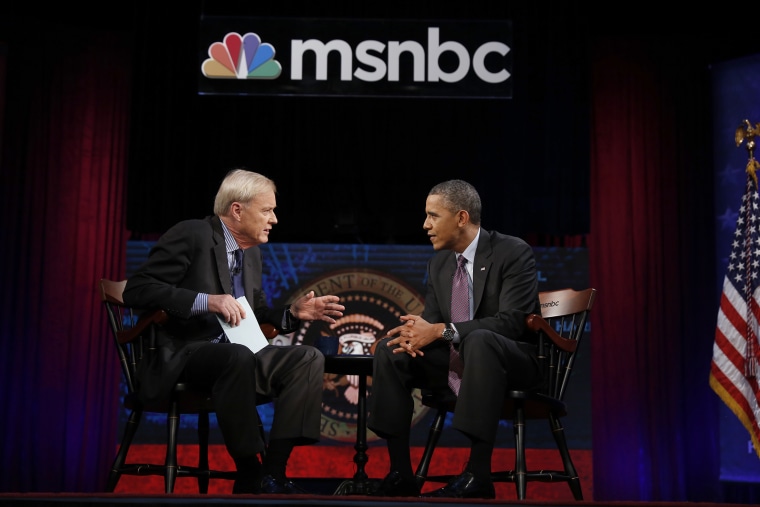In a reflective mood Thursday, President Barack Obama spoke candidly to msnbc’s Chris Matthews about the challenges of being commander in chief and the legacy he will leave behind. Above all, he urged young people not to lose faith in the notion that government could genuinely improve Americans’ lives.
“The interesting thing about now having been president for five years is it makes you humbler as opposed to cockier about what you as an individual can do,” Obama said. “You recognize that you’re just part of the sweep of history and your job really is to push the boulder up the hill a little bit before somebody pushes it up a little further and the task never stops at perfecting our union.”
The interview was conducted at American University before an audience of college students, a crucial component of the electoral coalition that put him in office in 2008 and re-elected him in 2012. Obama, whose approval ratings are scraping bottom this month, told the audience that he needed them to help overcome a "faction of the Republican party that sees compromise as a dirty word” and finish the job they sent him to do. That meant getting past whatever frustration they might have over Congressional gridlock, or the health care law’s stumbles, or Edward Snowden’s NSA leaks, and showing up to vote Democrat in November.
“Young people in particular have a tendency to vote during presidential years and then just are not excited at all during midterms,” he said. “These midterm elections in many ways are more important, because that’s what’s going to determine who’s in charge of Congress. And you may agree with me or disagree with me, but don’t think that it all ends with me.”
It isn’t just the midterm elections where Obama needs the twenty something set to salvage his legacy. The president is counting on millions of young and healthy Americans to sign up for health care through the Affordable Care Act’s exchanges this year to keep premiums down by offsetting the cost of older and sicker customers.
“My advice to everybody is the website’s now working, go to Healthcare.gov, take a look for yourself, in your state, what’s available to you,” he said. “There is no reason why you should not have health insurance.”
The last time Obama joined Matthews to talk to students was April 2008. At the time, the top issue in the campaign was Iraq, then-Senator Obama said he opposed gay marriage, and his promises to pass Wall Street reform, increase infrastructure spending, and reform the health care system were a platform to sell, not a record to defend. He added that he was particularly heartened to see so many young voters turning out for his rallies, which centered on an upbeat “post-partisan” message of bipartisan cooperation.
Five years of unyielding conservative opposition have tested that optimism. While Obama said Thursday that tea party Republicans had stymied his earnest attempts at compromise, he added that dramatic change likely required a Democratic House and Senate even in the best of circumstances.
“In our history, usually when we've made big progress on issues it actually has been when one party controlled the government for a period of time,” he said. “The big strides we made in the New Deal, the big strides we made with the Great Society, you know, those were times where you had a big majority.”
Nonetheless, he said he saw opportunities to work with the current Congress on a handful of issues where there was some common ground, particularly immigration reform.
“I actually think there are a bunch of Republicans who want to get stuff done,” he said. “They’ve got to be embarrassed. Because the truth of the matter is that they’ve now been in charge of the House of Representatives...in one branch of government, for a couple of years now. And they just don’t have a lot to show for it.”
Despite these struggles, the president warned young Americans not to be disillusioned by the bitter partisan warfare that’s dragged both Obama and Congress to unprecedented polling lows.
“When you look at our history, there have been a lot of times where Congress gets stuck, but we get through it,” he said. “And the reason we get through it is ultimately the American people have pretty good instincts.”
Addressing a more general dissatisfaction with government among Americans, Obama complained that news coverage by nature tended to stress federal officials' failures.
"When we do things right, they don't get a lot of attention," he said. "If we do something that is perceived, at least initially, as a screw-up, it'll be on the nightly news for a week.."
He offered as one example FEMA director Craig Fugate's relatively unheralded success managing disaster relief after a troubled period under President Bush.
"He is doing a heck of a job," Obama said, an allusion to Bush's infamous praise for ex-FEMA director Michael Brown after Hurricane Katrina.
By contrast, he cited the outrage over "an [IRS] office in Cincinnati" that had used politically loaded terms to evaluate nonprofits' tax-exempt status under new election regulations.
The president concluded with a special nod of encouragement to those in the audience considering a career in politics and government themselves.
“It continues to be a way to serve that I think can be noble,” he said.
